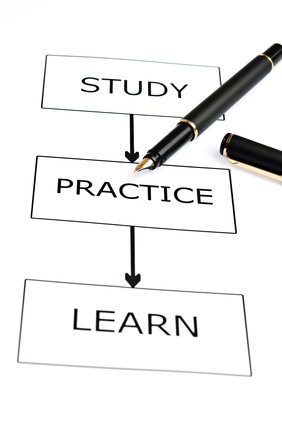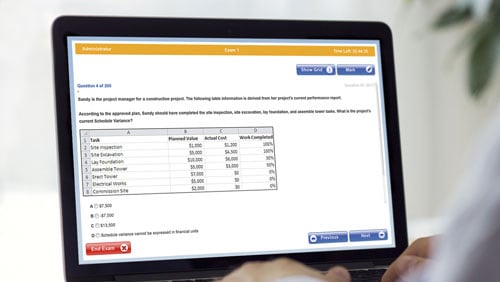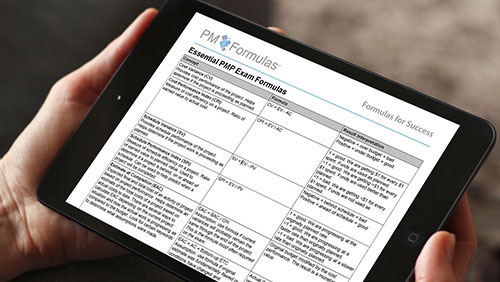5 Reasons NOT to take a PMP® Boot Camp for your PMP Exam Prep
 (Note: This article shows just one side of the story. Please also read our article "5 Reasons FOR taking an Exam Boot Camp" to get the full and balanced picture")
(Note: This article shows just one side of the story. Please also read our article "5 Reasons FOR taking an Exam Boot Camp" to get the full and balanced picture")
Often touted as “ideal targeted training” for the Project Management Professional (PMP)® exam, many people find PMP® boot camps are an attractive option for PMP exam preparation.
While boot camps are designed to deliver noticeable results with a high-output of effort in a short period of time, the drawbacks of choosing this path for exam preparation often outweigh the benefits.
PMP bootcamp may work for some because the instructors are usually highly qualified with master’s degrees, prior training, and years of industry experience. Most also offer a pass guarantee and will assume financial risk if you fail. They may offer to pay for your exam re-take or provide custom coaching and feedback.
Continue Reading
Begin your PMP® study with The PMP® Credentials Handbook
 The Project Management Institute (PMI)® has published the Project Management Professional (PMP)® Credentials Handbook, which you can find at the following URL: http://www.pmi.org/Certification/~/media/PDF/Certifications/pdc_pmphandbook.ashx. The Credentials Handbook explains everything that you want to know about the process of taking the PMP® exam and becoming PMP® certified. It discusses the following topics and questions:
The Project Management Institute (PMI)® has published the Project Management Professional (PMP)® Credentials Handbook, which you can find at the following URL: http://www.pmi.org/Certification/~/media/PDF/Certifications/pdc_pmphandbook.ashx. The Credentials Handbook explains everything that you want to know about the process of taking the PMP® exam and becoming PMP® certified. It discusses the following topics and questions:
1. PMP® Eligibility
Eligibility: Who can take the exam? How much project management experience do I need? What are these 35 contact hours all about?
2. PMP® Exam Information
Examination Information: What is the format of the exam? How much does it cost? How do I get my score? What about re-examinations? Can people with handicaps take the exam?
Continue Reading
8 Basic PMP® Study Tips in Preparing for the PMP® examination
 Studying for the Project Management Professional (PMP)® exam is a highly individual journey; however, here are a few basic study tips that you may want to consider:
Studying for the Project Management Professional (PMP)® exam is a highly individual journey; however, here are a few basic study tips that you may want to consider:
1. Go to www.pmi.org today and register for the PMP® exam. Having signed up and paid your fee is the best incentive possible.
2. Read the PMP Credentials Handbook to learn everything there is to know about the exam procedures.
3. Create a study plan. Define when and for how long you will study. This estimation will tell you how long it will take until you should take the exam. Plan the work and work the plan. Don't forget to tell your friends and family, so that they can support you and give you the time and space that you will need.
Continue Reading
Types of PMP® Exam Questions For You To Pass The PMP® Exam

You now have 35 contact hours and has been reading A Guide to the Project Management Body of Knowledge (PMBOK® Guide) cover to cover but is it enough to make sure you'll pass the Project Management Professional (PMP)® exam?
Anyone who has sat for the PMP® exam knows that studying the PMBOK® Guide and having 35 Contact Hours is just not enough. When you talk to them about the PMP Exam, they will tell you it covers a lot of ground and the questions are not as straightforward as one would hope. Of the ones that have passed the exam, an overwhelming percentage of them will tell you that they used more than just one study method.
Just as a golfer must learn to “drive” and “put” before they ever step onto a 18 hole golf course, the PMP Applicant must also learn the mechanics of taking the exam and what to expect when they arrive on game day. Employing multiple study methods may give you a triangulated understanding of the material as well as illuminating what you do know and what you don’t know.
Being able to answer PMP Exam sample questions is crucial to your exam success. Simple? In concept; yes. After all, the PMP exam has only multiple choice questions. However, there are a number of question styles; each has their purpose and caveats, which makes knowing how to get the most of each question exponentially crucial.
Let’s jump into the PMP Exam question types:
Continue Reading
Guide to Getting 35 Contact Hours for PMP® Eligibility
 In order to apply for the Project Management Professional (PMP)® Exam you will have to evidence "35 contact hours of formal education.” The Project Management Institute (PMI)® explains this as follows in the PMP® Credentials Handbook:
In order to apply for the Project Management Professional (PMP)® Exam you will have to evidence "35 contact hours of formal education.” The Project Management Institute (PMI)® explains this as follows in the PMP® Credentials Handbook:
"Verify at least 35 contact hours of specific instruction that addressed learning objectives in project management. Document all education hours regardless of when they were accrued. The course work must be completed at the time you submit the application. The course hours may include content on project quality, scope, time, cost, human resources, communications, risk, procurement and integration management."
Continue Reading
A PMP® Exam Simulator Will Help You Pass the PMP® Exam
 The Project Management Professional (PMP)® credential is considered all over the world as a mark of a professional project manager. Employers take the credential into account when recruiting, and it also provides individuals with confidence in their own abilities. However, becoming PMP certified requires a pass mark in the exam as well as practical experience, so preparing fully for your exam day will give you the best possible chance of becoming certified.
The Project Management Professional (PMP)® credential is considered all over the world as a mark of a professional project manager. Employers take the credential into account when recruiting, and it also provides individuals with confidence in their own abilities. However, becoming PMP certified requires a pass mark in the exam as well as practical experience, so preparing fully for your exam day will give you the best possible chance of becoming certified.
Reading A Guide to the Project Management Body of Knowledge (PMBOK® Guide) and learning the project management theory is only part of the preparation you can do. There are a number of PMP exam simulators available and these products help you prepare for the style of exam by providing the opportunity to take sample exams before you sit the real thing. Here are 5 reasons why an exam simulator should be an essential part of your preparation for the exam.
Continue Reading
The 4 Secret Ingredients to Pass the PMP® Examination
 The Project Management Professional (PMP)® exam is developed and administered by the Project Management Institute (PMI)® to measure and assess an individual’s ability to apply project management skills in six different domains. Initiation, planning, execution, monitoring and controlling, closing the project, as well as professional and social responsibility are evaluated. Don’t be intimidated! While the material may seem overwhelming, there are a few important factors to consider when preparing to successfully earn your PMP certificate. Experience, understanding of project management principles, developing a solid study plan and reliably sticking to it, as well as practicing exam-taking strategies are essential ingredients for PMP® exam success.
The Project Management Professional (PMP)® exam is developed and administered by the Project Management Institute (PMI)® to measure and assess an individual’s ability to apply project management skills in six different domains. Initiation, planning, execution, monitoring and controlling, closing the project, as well as professional and social responsibility are evaluated. Don’t be intimidated! While the material may seem overwhelming, there are a few important factors to consider when preparing to successfully earn your PMP certificate. Experience, understanding of project management principles, developing a solid study plan and reliably sticking to it, as well as practicing exam-taking strategies are essential ingredients for PMP® exam success.
Continue Reading
What is a PMP® Exam Simulator?

PMP exam simulator, PMP mock exam, PMP exam simulation software - different terms but synonymous in meaning.
What is it exactly? How can it help you prepare for the PMP exam?
The PMP exam is a 4-hour, 200 question, multiple-choice, computer-based exam that leads to the Project Management Professional credential. It is based largely on the contents of A Guide to the Project Management Body of Knowledge (PMBOK® Guide), although you will probably want to use other books as well during your exam preparation. The PMBOK® Guide is wide-ranging and covers many concepts: the exam contains questions from all the knowledge areas, so there is a lot of material for you to cover in your study.
Continue Reading
 It's no secret! The Project Management Professional (PMP)® certification from Project Management Institute (PMI)® is a stepping stone for project managers to climb up the corporate ladder. It provides you with the most sought after appreciation and visibility within your organization. The certification enhances your chances of professional growth within the organization and opens up new avenues. It validates your skills as an efficient project management professional. It not only enhances your earning potential but also provides you with a competitive stand in the job market.
It's no secret! The Project Management Professional (PMP)® certification from Project Management Institute (PMI)® is a stepping stone for project managers to climb up the corporate ladder. It provides you with the most sought after appreciation and visibility within your organization. The certification enhances your chances of professional growth within the organization and opens up new avenues. It validates your skills as an efficient project management professional. It not only enhances your earning potential but also provides you with a competitive stand in the job market.  Do you feel that in order to pass the Project Management Professional (PMP)® exam you should memorize the ITTOs (Inputs, Tools, Techniques and Outputs) from A Guide to the Project Management Body of Knowledge (PMBOK® Guide)? Do you think that the PMP® exam is full of ITTO type of questions? Many people still believe this myth. Well, let me clear some misconceptions...
Do you feel that in order to pass the Project Management Professional (PMP)® exam you should memorize the ITTOs (Inputs, Tools, Techniques and Outputs) from A Guide to the Project Management Body of Knowledge (PMBOK® Guide)? Do you think that the PMP® exam is full of ITTO type of questions? Many people still believe this myth. Well, let me clear some misconceptions... Please note: This article shows just one side of the story. If you want to get the full and balanced picture, read our article "5 Reasons NOT to take an Exam Boot Camp".
Please note: This article shows just one side of the story. If you want to get the full and balanced picture, read our article "5 Reasons NOT to take an Exam Boot Camp". (Note: This article shows just one side of the story. Please also read our article "
(Note: This article shows just one side of the story. Please also read our article " The Project Management Institute (PMI)® has published the Project Management Professional (PMP)® Credentials Handbook, which you can find at the following URL:
The Project Management Institute (PMI)® has published the Project Management Professional (PMP)® Credentials Handbook, which you can find at the following URL:  Studying for the Project Management Professional (PMP)® exam is a highly individual journey; however, here are a few basic study tips that you may want to consider:
Studying for the Project Management Professional (PMP)® exam is a highly individual journey; however, here are a few basic study tips that you may want to consider:
 In order to apply for the Project Management Professional (PMP)® Exam you will have to evidence "35 contact hours of formal education.” The Project Management Institute (PMI)® explains this as follows in the PMP® Credentials Handbook:
In order to apply for the Project Management Professional (PMP)® Exam you will have to evidence "35 contact hours of formal education.” The Project Management Institute (PMI)® explains this as follows in the PMP® Credentials Handbook: The
The  The Project Management Professional (PMP)® exam is developed and administered by the
The Project Management Professional (PMP)® exam is developed and administered by the 


